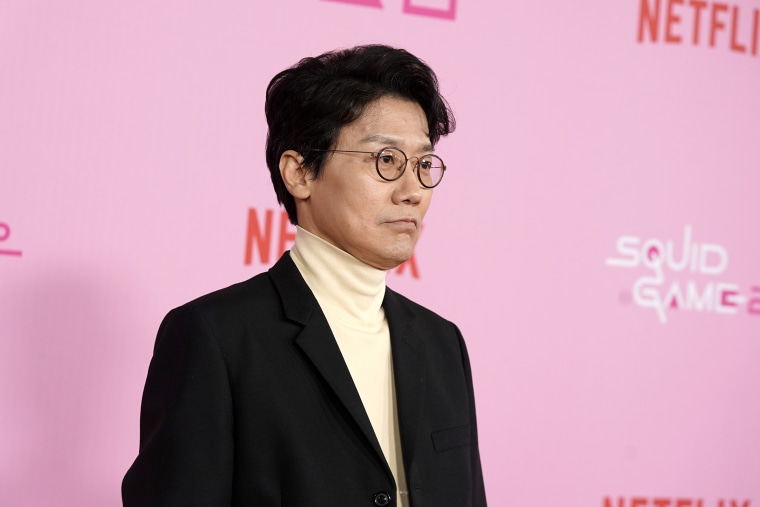
After the sophomore-season premiere of Netflix’s wildly popular thriller series “Squid Game,” many viewers are criticizing the South Korean show for casting a straight, cisgender male actor as a transgender woman contestant in the deadly games.
The new season, which debuted Thursday, features actor Park Sung-hoon, known for playing villains in the television series “The Glory” and “Queen of Tears,” as Hyun-ju, a contestant who enters the high-stakes game in hopes of using her winnings to pay for her gender-affirming surgery.
WATCH ANYTIME FOR FREE
Stream NBC10 Boston news for free, 24/7, wherever you are. |
While some viewers speculated that the storyline could help bring attention to the trans community — which is marginalized in Korean society and underrepresented in the country’s entertainment industry — others said the series missed the mark by not having a trans actor in the role.
“Netflix squid games 2 didn’t hit the same bc they hired a straight guy to play this character,” one viewer posted on X. “Felt forced instead of organic.”
Get updates on what's happening in Boston to your inbox. Sign up for our News Headlines newsletter.

Neither “Squid Game” creator Hwang Dong-hyuk nor Park responded to NBC News’ request for comment. Netflix confirmed that the show did work with trans and LGBTQ consultants while creating the second season, but in an interview with TV Guide, Hwang said it was “near impossible” to find a trans actor for the role.
“When we researched in Korea, there are close to no actors that are openly trans, let alone openly gay,” he told the outlet. “Unfortunately in the Korean society currently the LGBTQ community is rather still marginalized and more neglected, which is heartbreaking.”
Entertainment News
The second season once again revolves around Player 456, whose real name is Gi-hun, as he re-enters the game three years after his initial victory. This time, he’s come with the sole purpose of putting an end to it and protecting his fellow players from violence and death.
Among the contestants is Hyun-ju, a former Special Forces soldier who becomes increasingly valuable to her fellow players as both an emotional rock and a competitive force. In one scene, Hyun-ju explains why she wants to stick with the game rather than opt out, revealing to the others that once she started her gender transition, “everything changed.”
“My mom cried a lot. And my father stopped talking to me. I got fired from my job, and lost all my friends,” Hyun-ju says, explaining that, with the winnings, she’ll move to Thailand, finish her transition and start a new life. “I wasn’t done with the treatment and the procedures. but I wasn’t earning any money so my debt kept piling up. Although I felt liberated, my life became so much harder.”

Park described Hyun-ju as a character who, in spite of the prejudice and difficulty she’s had to face, continues to show “incredible strength, decisiveness and natural leadership.”
“Through her resilience, she breaks down stereotypes and shines as an inspiring character,” Park said.
While Hwang said he had “complete trust” in Park to portray the character well, critics argued that proper representation involves more than just talent — it’s also about trans visibility.
“The fact that a man is acting as the trans woman in squid game doesn’t sit right with me,” another X user posted. “I get they’re trying to be inclusive but just hire a real trans woman or a woman.”
John Cho, an assistant professor of anthropology at the University of British Columbia, who specializes in gender and sexuality and queer studies, explained that for many racial and sexual minorities, the casting of a cisgender man in one of the rare transgender roles in Korea can be viewed as a “slap in the face.” He also said it exposed a glaring disparity.
“It’s not like you have hundreds of trans actors or actresses representing cisgender characters,” Cho said. “There are these historically embedded structural inequalities in terms of access to representation.”
While highlighting a trans storyline could be a positive step forward, he added, “trans people and queer people in general have historically and still continue to be denied visibility as citizens.”
Cho said the issue can’t be examined without looking into the real disparities that have existed for the queer community in Korea. In a poll of South Korean LGBTQ youth that was included in a 2021 Human Rights Watch report, 96% of respondents said they experienced discrimination or bullying in school. The report also referenced a 2014 poll by the National Human Rights Commission of Korea which showed 80% of LGBTQ youth reported receiving discriminatory comments from teachers.
One potential reason for this, Cho said, is that over the years, the country has attempted to establish itself as a nation state with its military and the reinforcement of traditional masculinity standards. In 2021, a trans soldier, Staff Sgt. Byun Hui-su, died by suicide after being dismissed from the military. She had wanted to transfer to the military’s female corps after undergoing gender-affirming surgery but was deemed “disabled” and unfit for service due to the surgery. Months after her death, the Daejeon District Court ordered the army to recognize her as a woman and annul her dismissal in a posthumus win.
“This controversy is important because it’s starting conversations,” Cho said. “But these conversations need to be much more expanded and complicated so we’re not stuck.”
This story first appeared on NBCNews.com. More on NBC News:



